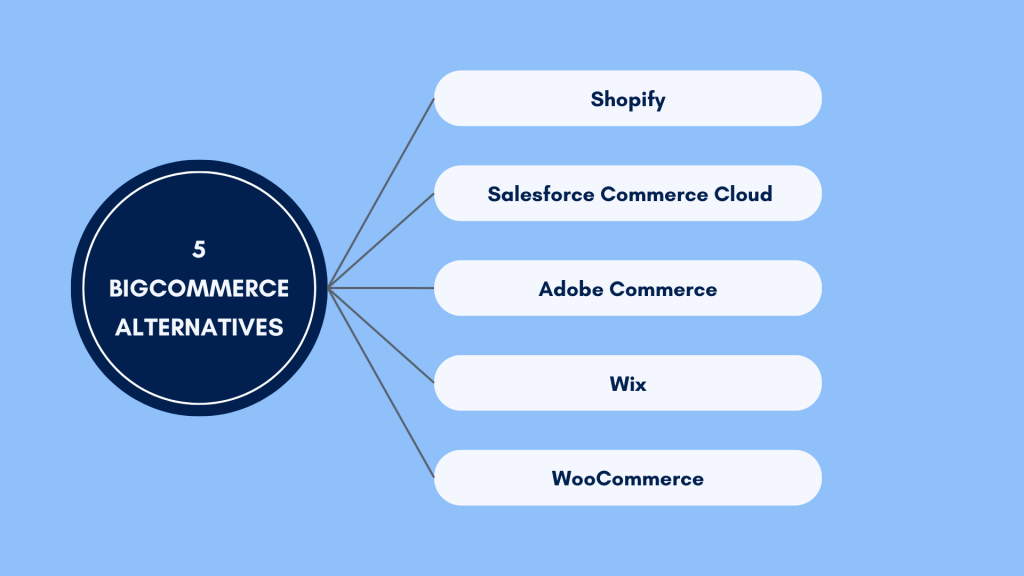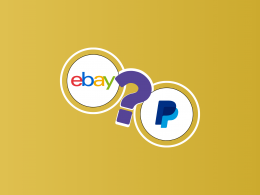BigCommerce is an ecommerce platform that allows you to set up and manage your ecommerce store and build your business ecosystem around it. It offers plenty of built-in tools to help you with various aspects of your business, like marketing, shipping, inventory, promotions, and more. Besides, there are about 1000+ apps and integrations in BigCommerce’s app store, so you can choose more tools to improve your store’s performance further on.
Let’s look at what BigCommerce’s app store has under the hood to let you turn your online store into an entire business management system.
Let’s go!
Key takeaways
- BigCommerce excels in offering out-of-the-box features, scalability, and an extensive collection of apps and integrations to enhance online store functionality.
- Businesses with specific needs or requiring advanced customization beyond BigCommerce’s capabilities may find alternative platforms better suited to their requirements.
- Alternative platforms like Shopify, Salesforce Commerce Cloud, Magento Commerce, Wix, and WooCommerce offer diverse solutions catering to different business sizes, industries, and customization preferences.
A quick overview of the BigCommerce ecommerce platform
BigCommerce is an ecommerce platform that helps businesses create online stores to sell their products or services. It offers a range of features and tools that allow them to set up and manage their online stores, providing means of handling various aspects of an ecommerce business.
Let’s look at what BigCommerce is capable of.
BigCommerce enables users to design their online stores using customizable templates. It facilitates the management of products, allowing for easy addition, editing, and organization of product details such as descriptions, images, and prices. The platform supports various payment methods, ensuring secure transactions for customers. Additionally, it provides tools for order management, inventory tracking, shipping, and returns processing.
In terms of marketing, BigCommerce offers functionalities like search engine optimization (SEO), email marketing, and social media integration to attract and retain customers. Users can access detailed analytics and reporting features to gain insights into their store’s performance, including sales trends, customer behavior, and traffic sources.
BigCommerce can integrate with accounting software – QuickBooks Online and more – to automatically synchronize sales transactions between the systems and have accurate records in the books.
Book your seat at our Weekly Public Demo to see how you can integrate BigCommerce with accounting, using Synder, or explore it yourself with a 15-day all-inclusive free trial.
For those wishing to extend their store’s functionality even more or using certain marketing, support, payment, and other systems, BigCommerce offers over a thousand of third-party apps compatible with the platform. It allows you to build your comprehencive store management system aroung BigCommerce.
It’s definitely an advange, however, BigCommerce might not suite your business or not address some particular needs of yours. At this point, you might want to consider an alternative. But befor we get to potentially best alternatives to BigCommerce, lets look at who can benefit the most from BigCommers, and why some businesses might decide against it.
Who should use BigCommerce: why would you choose it over BigCommerce competitors?
Compared to its competitors, BigCommerce offers more out-of-the-box features without the need for extensive customizations or additional app purchases. It also doesn’t charge transaction fees on sales, which can result in significant savings for businesses with high sales volumes.
Several other things might influence a business’s decision to go with thit platform.
Scalability for growing businesses
BigCommerce is an excellent ecommerce platform that can effortlessly adapt to your business’s growth. It provides a robust framework that can support your expansion plans without requiring you to migrate to a new platform. This is particularly beneficial for businesses that aim to enhance their online presence significantly.
Friendly and intuitive UI
Ease of use is a critical factor when choosing an ecommerce platform. BigCommerce offers a user-friendly interface that simplifies setting up and managing your online store. You might like its intuitive dashboard navigation, straightforward product management, and seamless order processing. It’s a huge pro for business owners without extensive technical expertise, as there’s almost no learning curve, and you immediately get full control of your online operations.
Extensive apps collection
As mentioned, a significant advantage of BigCommerce is its extensive collection of apps and integrations. The platform boasts a wide array of third-party applications and services that can be seamlessly integrated into your store.
All the above makes BigCommerce an excellent choice for businesses seeking a scalable, user-friendly ecommerce platform with a rich feature set.
Reasons to seek for BigCommerce alternatives
Some businesses have very specific needs that BigCommerce may not fully cater to. While its extensive app collection and built-in features are comprehensive, certain niche functionalities or industry-specific tools might be lacking.
Your business might rely heavily on a unique sales model or require advanced customization beyond what BigCommerce offers, you might find a more specialized platform a better choice.
Or you might just not like the vibe, you know.
The reasons behind looking for a BigCommerce alternative might be various. Here’s a couple of examples.
Growth anticipation
Organizations that need more customizable ecommerce solutions or expect to grow might look for options with more features and better means to adjust to the fast-growing needs.
Integration and cost considerations
Companies with strict integration requirements for other applications, utilizing particular tools they want to keep using, or those chasing the better value for the money may consider other options providing more flexibility in integration and costs that may be in line with their financial objectives.
User experience and support
Companies dedicated to improving the end-user and customer experience, combined with dependable customer support and resources they need, might be interested in options with more features for customer satisfaction that BigCommerce might lack.
Whichever the reason is, you might want to learn your options.
So, what would you chose from? Let’s go and look at BigCommerce competitors providing alternative platforms you might find more suitable for your business needs and requirements.
BigCommerce alternatives you might want to consider
When choosing an alternative to BigCommerce you might want to consider various factors, including your business size, the complexity and volume of transactions you handle, your requirements to the management tools and integration capabilities, and more. In other words, you need to put your business needs in front and look at the platform’s capabilities against those needs.
But let’s get to some of the most notable BigCommerce alternatives without much further ado.

#1 – Shopify
Shopify is perhaps the most well-known ecommerce platform, celebrated for its ease of use and comprehensive features. It’s an excellent choice for small to medium-sized businesses looking for a user-friendly platform that doesn’t require a steep learning curve.
Shopify offers a wide range of templates and apps, allowing for significant customization and functionality enhancements. Its subscription model also includes hosting, making it a convenient all-in-one solution for many businesses.
Shopify’s Buy Button
One distinctive feature that Shopify possesses and BigCommerce does not is the Buy Button.
Shopify Buy Button helps users install a button on any website or blog that they regularly use to sell products through those sites. This feature is exclusive to Shopify and can be beneficial in several ways.
Let’s break them down.
- Embedding capability
You can easily integrate the Buy Button into any website, blog, or webpage not necessarily affiliated with the Shopify platform. This makes it possible to convert any online presence to a sales channel, expanding a Shopify store beyond the platform. - Customization
You can change the appearance of the Buy Button to blend it with the overall design of a website or a blog being utilized. It helps avoid any disruption, and the branding stays intact. - Simplified checkout
When customers click the Buy Button, they are taken to a more streamlined purchasing process or, in some cases, to a purchasing interface on the same website on which the Buy Button was clicked. This reduces dropouts and may aid in raising the conversion rates. - Integration with various platforms
The Buy Button can be integrated with pretty much any platform, including WordPress, Squarespace, and Tumblr, to name a few. So, any business with a web presence can use their existing spaces to sell products without having to shift to a new platform. - Direct product links
The Buy Button can be coded to point to individual products so one can use it for precise selling promotions. It can be particularly important to feature particular products or during occasions such as a sale. - Tracking and analytics
The Buy Button is also available for customization with analytics on its performance as an added feature by Shopify. Some of this information can be used to progress marketing strategies and enhance the efficiency of selling operations.
Thus, while BigCommerce provides multiple ways of connecting with other websites and applications, it lacks a feature like the Shopify Buy Button that lets users instantly place single products from the outside website on their sale list. BigCommerce, as a rule, uses more complicated connections or redirections to the primary store.
#2 – Salesforce Commerce Cloud
Formerly known as Demandware, Salesforce Commerce Cloud is a cloud-based enterprise-level ecommerce platform designed for large businesses and enterprises. It offers a powerful set of features tailored for scalability, global expansion, and complex business models.
This platform is known for its advanced customer relationship management (CRM) capabilities, extensive customization options, and robust customer support. It’s ideal for businesses looking for a comprehensive, enterprise-grade ecommerce solution with strong emphasis on customer experiences.
Salesforce Einstein AI
A truly unique aspect of Salesforce Commerce Cloud that BigCommerce lacks is Salesforce’s Einstein AI.
Salesforce Commerce Cloud works with Salesforce Einstein, an advanced AI tool that can be used to improve the ecommerce site. That is why the following aspects of Salesforce Einstein are so significant.
- Personalized product recommendations
Einstein can analyze the consumers’ behavior and provide customized recommendations for product consumption in real time. This makes shopping easier and more enjoyable for the customers since it displays products they might be interested in. - Predictive sort
This feature employs the application of Artificial Intelligence in sorting the products to enhance the chances of conversion. Since it reflects customer behavior and their previous choices, it can sort the products in real time. - Einstein search dictionaries
These search dictionaries enhance the search results quality and relevancy for customers as the search application learns from them and improves the algorithms progressively. It can help customers with better search results by cutting down on the time needed to find products. - Commerce insights
With its help, businesses can gain valuable information about customers’ behavior, sales activity, and the performance of different products. This enables the firms to make the right decisions for the right strategies to adopt in their product portfolios, promotional techniques, and e-business in general. - Automated email personalization
Einstein can automatically personalize the emails sent to customers, so the contents and products recommended are specifically tuned to their interests and activities - Customer segmentation
Through the help of AI, Einstein can categorize customers according to their behavioral patterns, shopping habits, and choices. This means that marketing can be done more strategically to achieve its goals.
Some of the features and integration provided by BigCommerce are designed to improve the online trading experience, some level of customization, and analytical tools. Still, it lacks an AI-driven set of tools inherent to Salesforce Einstein that provide a unique and fully automated approach to personalization, predictive modeling, and customer intelligence.
#3 – Magento Commerce (Adobe Commerce)
Magento Commerce is an open-source ecommerce platform that offers a high degree of customization and flexibility. It’s best suited for medium to large businesses that require complex, customized ecommerce solutions.
Magento demands a certain level of technical expertise to fully leverage its capabilities, making it a favorite among developers. It supports a vast global ecosystem of developers and has a large library of extensions. Magento is a solid choice for businesses looking for a powerful, scalable platform and are willing to invest in development resources.
The flexibility of being open-source
Magento Commerce is built on an open-source platform, giving developers full access to the source code. This allows for extensive customization and flexibility, enabling businesses to tailor their e-commerce stores to meet specific requirements without the limitations of proprietary software.
Here’s why it matters:
- Magento’s open-source nature allows for unrestricted customization of the platform to fit unique business needs. So, businesses have full control over the codebase, enabling them to create highly tailored ecommerce solutions.
- Being open-source fosters a vibrant community of developers, designers, and merchants contributing to the platform’s development. This results in a rich ecosystem of extensions, themes, and resources, providing businesses with an array of options to enhance their online stores.
- With access to the source code, businesses can scale their Magento stores without being constrained by platform limitations. So, the platform can grow and evolve alongside the business and its growing ecommerce operations.
Read a more comprehensive comparison of BigCommerce and Magento.
#4 – Wix
Wix is a web development platform that offers an easy-to-use, drag-and-drop interface, making it highly accessible for beginners. While initially known for general website creation, Wix has expanded its ecommerce capabilities, offering a simple yet effective solution for small businesses and entrepreneurs.
It provides a range of templates and design tools, allowing users to create visually appealing online stores without the need for coding skills. Wix is best suited for small businesses and individuals looking for an affordable and straightforward way to start selling online.
Wix’s Drag-and-Drop website builder
Wix strives to simplify creation of a webstore as much as providing a simple drag-and-drop site constructor, allowing for a visual creating experience, adding elements like images, text boxes, videos, and buttons onto your site. You don’t need to know how to code or have technical skills to design your website with Wix.
Let’s break down how it makes your life better.
- Friendly store creation experience
Wix’s drag-and-drop interface makes it simple for anyone to create a professional-looking website quickly and easily. You can see how your site will look as you build it, which helps you visualize the end result. - Customization
With Wix, you have full control over the design of your website. You can choose from a wide range of templates and customize them to match your brand and style. Plus, you can easily add features like contact forms, galleries, and online stores without any coding knowledge. - Time-saving
Because you can drag and drop elements onto your site, you can build and update your website faster compared to platforms that require coding or more complex editing processes. - Accessibility
Wix’s drag-and-drop builder makes website creation accessible to everyone, regardless of their technical background. Whether you’re a small business owner, a blogger, or an artist, you can use Wix to create a professional online presence without hiring a web designer.
#5 – WooCommerce
WooCommerce is a free, open-source ecommerce plugin for WordPress. It’s a fantastic choice for existing WordPress users or businesses that prioritize content marketing within their sales strategy.
WooCommerce allows for extensive customization through themes and plugins, offering the flexibility to create a tailored online store on the WordPress platform. It’s particularly appealing for small to medium-sized businesses and is highly cost-effective, especially for those already using WordPress for their websites.
As mentioned, these platforms are the most popular ecommerce platforms. As the market is quite extensive, there are much more than that. So you can find a solution to suite your needs nearly perfectly.
Integration with WordPress
WooCommerce’s native integration with WordPress is what makes it an absolute winner when building an online store for a WordPress site. It quite obviously beats BigCommerce here for WordPress users.
No need to recall that WooCommerce is a plugin for WordPress, allowing users to add ecommerce functionality to their existing WordPress websites. It comes with benefits.
- Content and commerce integration
WooCommerce integrates WordPress’s content management features with robust ecommerce capabilities for a seamless experience in managing content and products on one platform. - Flexibility and customization
WordPress is known for its flexibility and extensive ecosystem of themes and plugins. By integrating with WordPress, WooCommerce inherits this flexibility, allowing users to customize their online stores to match their unique branding and business requirements. - SEO benefits
WordPress is renowned for its search engine optimization (SEO) capabilities, so users can take advantage of its built-in SEO features to optimize their online stores for better search engine visibility and rankings. - Community support
A large and active community of developers and users behind WordPress contributes significantly to its ongoing development and provides support and resources. So, whenever you face trouble or have a question about your WooCommerce store, you might turn to this knowledge poo for help.
Don’t want to choose? Integrate them all with Synder
Now, as a business, you might use several platforms to reach a broader audience and maximize sales. Totally makes sense.
For example, you might operate a BigCommerce store and have an ecommerce section on your WordPress site via WooCommerce.
And here may come the problem.
Managing a business across multiple ecommerce platforms can be challenging due to differences in transaction handling, customer data, and inventory management. While shifting onto one platform may seem like a solution, selling through various marketplaces makes the issue persist. Integrating your data separately from each channel can lead to fragmented or duplicate records and accounting errors. So, having a tool that can integrate all your sales channels, like ecommerce websites, marketplaces, and payment gateways in your accounting system, looks like a better solution.
And you can do it with Synder
It can connect various sales channels to your accounting software, ensuring all your financial data is synchronized and consolidated. Here’s a sneak peek at how Synder manages this integration.
- Unified sales data
Synder collects sales data from multiple ecommerce platforms, including BigCommerce and WooCommerce (and many more), and syncs it with your accounting software. This way, all your sales transactions are recorded in one place, giving you a complete view of your business performance. - Automatic reconciliation
Synder automatically syncs transactions, eliminating the need for manual data entry and reducing the risk of errors. It also reconciles transactions from your sales platforms with those recorded in your bank, keeping your accounts accurate and up-to-date. - Real-time synchronization
Synder provides real-time synchronization of your sales data. Any transaction made on BigCommerce, WooCommerce, or any other connected platform is instantly reflected in your accounting software, helping you keep track of your financials as they happen. - Comprehensive reporting
With all your sales data unified, Synder enables detailed reporting and analytics within your accounting software. You can generate comprehensive reports that give you insights into your sales performance across different channels, helping you make informed business decisions. - Multi-currency and tax handling
For businesses operating across states or internationally, Synder supports multi-currency transactions and tax management. This ensures compliance with various tax regulations and simplifies the complexities of global sales. - Customer data synchronization
Synder also syncs customer data from your sales platforms to your accounting software, providing a complete customer profile and transaction history. This aids in better customer relationship management and targeted marketing efforts.
So, sometimes, you don’t need to choose between ecommerce platforms when you can integrate them all.
Bottom line
So, you can see that as much as it’s a complete ecommerce solution, BigCommerce lacks some features that business owners might look for: from better artificial intelligence to open-source advantage to visual website builder, and more. So, when deciding on the ecommerce platform to go with, you might want to consider which functionality is an absolute necessity for you.
Other things to consider might include the business size, number and frequency of the transactions, tools that are used in management, and capacity to integrate.
That’s to say, the decision should fulfill particular business criteria and objectives to guarantee that the adopted platform would be most suitable for them within their market niche and the requirements it dictates.
Share your thoughts
What do you believe to be the best alternative for BigCommerce? Share your opinion in the comments section below!











.png)